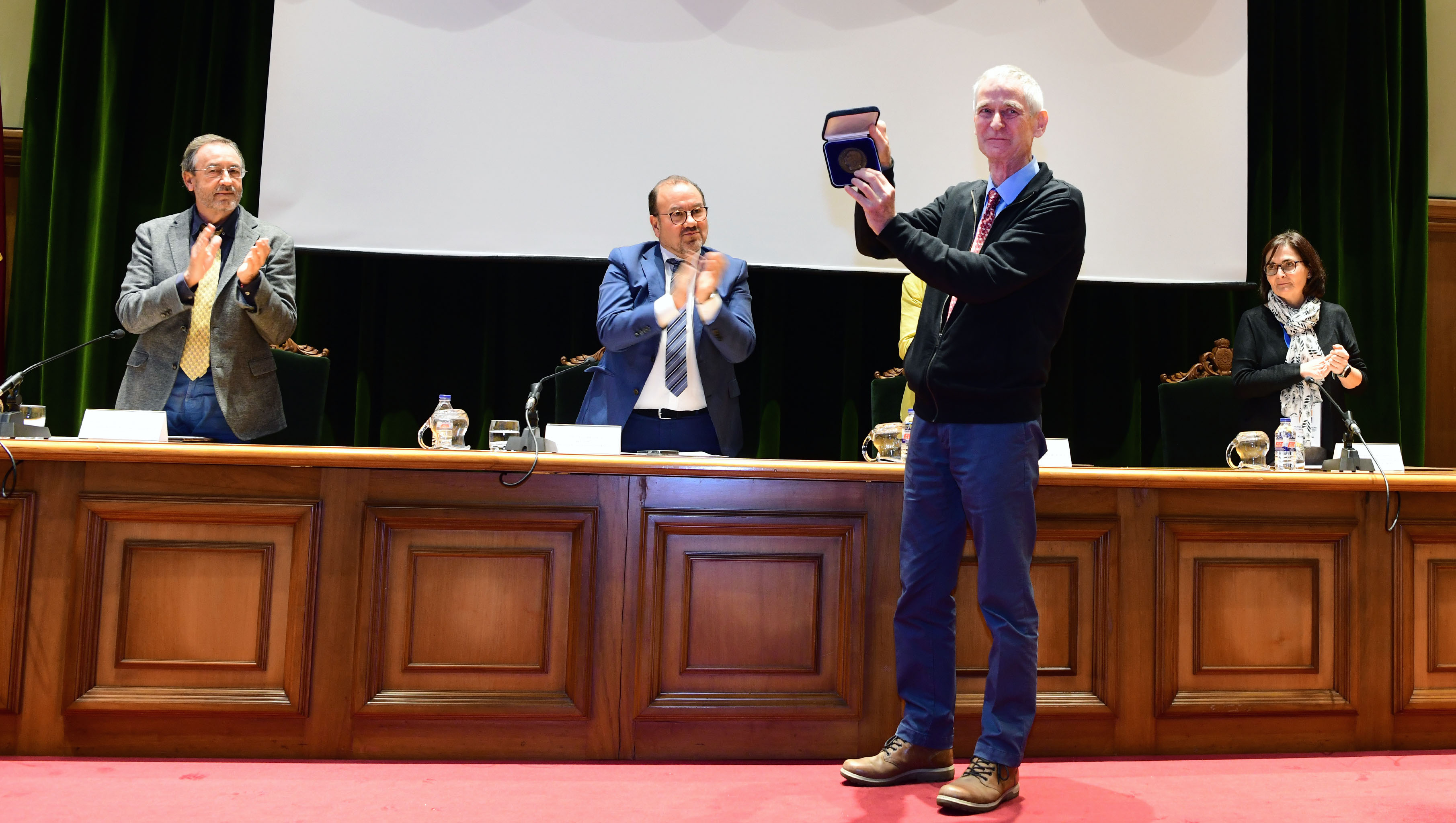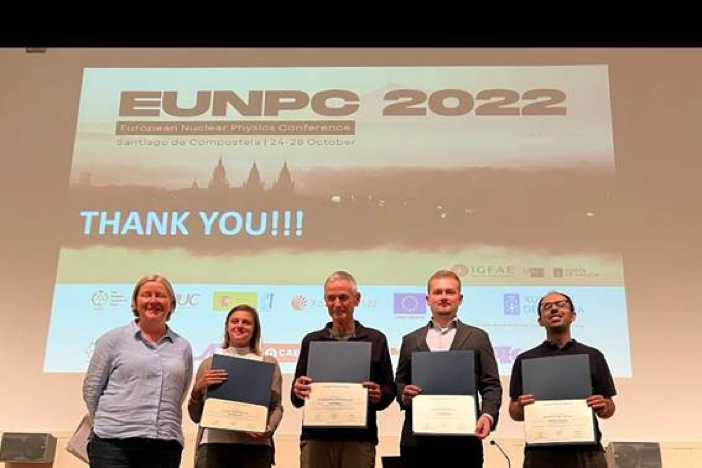|
|
Posted By Alessandra Fantoni,
Friday 9 December 2022
|
The 2022 edition of the European Nuclear Physics Conference (EuNPC), organized by the Nuclear Physics Board of the European Physical Society, took place, from 24th to the 28th of October 2022, in the beautiful Spanish city of Santiago de Compostela. It was the 5th edition of the EuNPC series, after the ones in Bochum, Bucharest, Groningen, and Bologna, and it gathered more than 200 participants from all over Europe, and beyond.
During five intense days, plenary and parallel talks provided the latest news on the themes dealt by the Nuclear Physics Division of EPS, such as nuclear structure and dynamics, heavy Ion collisions, theory and phenomenology, accelerators and applications.
Besides the scientific talks, four special sessions were held, two of which were devoted to award ceremonies and two to the EPS “Young Minds” project. The Lise Meitner Prize, which is given every two years for outstanding work in the fields of experimental, theoretical or applied nuclear science, was awarded to Prof. Phil Walker (University of Surrey). Prof. Walker earned the prestigious prize for his seminal contributions to the understanding of long-lived nuclear excited “isomeric” states and the factors that determine their half-lives, that range from nanoseconds to years. The PhD Prize, recognizing the excellence of a recent PhD thesis in experimental, theoretical or applied nuclear physics, was awarded to three young promising scientists: Giuliano Giacalone, for his thesis “Observing the shape of nuclei at high-energy colliders”; Jonas Karthein (“High-precision measurements in the direct vicinity of the doubly magic 100Sn (N=Z=50) at ISOLDE/CERN”); Ágota Koszorús (“Laser spectroscopy at the frontiers of RIB production”). The sessions devoted to the Young Minds (YM) project, which aims at boosting the career and the scientific creativity of young physicists around Europe and fostering the creation of an international network of young and motivated researchers, consisted in a roundtable on “Life beyond the PhD, a guide to a satisfactory professional career” and a workshop on “Well-being and Positive Mental Health in research career”. Both these sessions saw an important participation of young scientists, interacting actively with the panelists.
More information on EuNPC2022 can be found on the conference web site: https://indico.cern.ch/event/1104299/

Prof. Phil Walker receives the Lise Meitner Prize

From left to right: Prof. Miguel A. Sanchis Lozano (Vice chair of the RSEF), Prof. Alison Bruce (Chair of the EPS-NPD board), Prof. Antonio López Díaz (Chancellor of USC), Prof. Phil Walker, and Prof. Dolores Cortina, head of the EuNPC22 Local Organizing Committee.

From left to right: Prof. Alison Bruce (Chair of the EPS-NPD board), Dr. Ágota Koszorús, Prof. Phil Walker, Dr. Jonas Karthein, Dr. Giuliano Giacalone.
Tags:
2022
award
EPS NPD
EuNPC
European Nuclear Physics Conference
Lise Meitner Prize
Phd prize
Santiago de Compostela
Permalink
| Comments (0)
|
|
|
Posted By Alessandra Fantoni,
Tuesday 13 September 2022
|
The Nuclear Physics Division of the EPS has decided to award the 2018-2020 PhD Prize jointly to Dr. Giuliano Giacalone, Dr. Jonas Karthein, Dr. Ágota Koszorús
The theses of the winners are:
- Giuliano Giacalone, A matter of shape:seeing the deformation of atomic nuclei at high-energy colliders, Université de Paris-Saclay, France, November 2020.
- Jonas Karthein, Next-Generation Mass Spectrometry of Exotic Isotopes and Isomers, University of Heidelberg, Germany, May 2020.
- Ágota Koszorús, Collinear Resonance Ionization Spectroscopy of potassium isotopes: crossing N=32, KU Lueven, Belgium, September 2019.
The winners of the PhD Prize will be presented with diplomas on the final day of the 5th European Nuclear Physics Conference EuNPC (Santiago de Compostela - October 24-28, 2022) where they will give a plenary invited talk on their work on October 28, 2022. The winners are being supported to participate in the conference through generous sponsorship from the organisers.
Tags:
award
EPS NPD
Phd prize
Permalink
| Comments (0)
|
|
|
Posted By Administration,
Friday 22 July 2022
Updated: Friday 15 July 2022
|
The board of the Nuclear Physics Division (NPD) of the European Physical Society (EPS) has chosen, from among the worthy candidates that applied, the German city of Dresden, that the 11th edition of the Conference on Nuclear Physics in Astrophysics (NPA2024) will be hosted in the German city of Dresden, capital of Saxony.
Every two years the Nuclear Physics in Astrophysics Conference brings together researchers from a multi-disciplinary community of experimental and theoretical nuclear physicists, astronomers, astrophysicists and cosmo-chemists to discuss the current challenges of this exciting and fast developing research field.
The NPA conference is part of the series of NPD divisional conferences, comprising the European Nuclear Physics Conference (EuNPC) and the Applied Nuclear Physics (ANP) Conference.
The Technische Universitat Dresden and the Helmutz Center Dresden Rossendorf, along with institutions from Wroclaw (Poland), Berlin, and Potsdam, will organize the conference, which will be held in the main campus of the Technical University.
More details on NPA2024, such as the program, deadlines for abstract submission, information on accommodation, and the web site, will be provided in the upcoming months.
Tags:
EPS NPD
NPA
Nuclear Physics in Astrophysics Conference
TU Dresden
Permalink
| Comments (0)
|
|
|
Posted By Alessandra Fantoni,
Thursday 21 July 2022
Updated: Friday 15 July 2022
|
The Nuclear Physics Board of the European Physical Society has chosen, among other worthy candidates, the beautiful seaside Greek city of Thessaloniki as the hosting site for the 2024 edition of the Applied Nuclear Physics (ANP) conference. It will be the 2nd edition of the ANP series of conferences, after the first one held in Prague in 2021.
ANP2024 will be organized under the guidance of the Hellenic Nuclear Physics Society (HNPS), a non-profit organization, formed in 1990, of scientists studying fundamental problems related to the nature of matter, such as nuclear reactions and nuclear structure.
Many physicists of HNPS are involved in interdisciplinary studies on nuclear astrophysics and nuclear applications to meet societal needs, including medical diagnoses and environmental issues.
The conference will focus on applications of nuclear physics to energy, health, space, security, environment, material science, preservation and study of cultural heritage.
In particular, it will address the following topics: ion beam analytical methods in material science; ion and neutron beam irradiation of materials; nuclear physics for energy and space technologies; nuclear analytical methods for environmental and archaeological studies; nuclear physics in medicine.
The ANPC complements the series of NPD divisional conferences, comprising the European Nuclear Physics Conference (EuNPC) and the Nuclear Physics in Astrophysics (NPA) Conference. The organization of the 2024 edition will be led out by a consortium of universities and research centers from both Thessaloniki and Athens.
More details on ANP2024, such as the program, deadlines for abstract submission, information on accommodation, and the web site, will be provided in the upcoming months.
Tags:
ANP
Applied Nuclear Physics
EPS NPD
HNPS
Permalink
| Comments (0)
|
|
|
Posted By Administration,
Friday 15 July 2022
Updated: Friday 15 July 2022
|
The Nuclear Physics Division of the European Physical Society (EPS)
is delighted to announce that the winner of the 2022 Lise Meitner prize
is Prof. Phil Walker (University of Surrey). The prize
is given every two years for outstanding work in the fields of
experimental, theoretical or applied nuclear science and Prof. Walker
has been awarded the prize for seminal contributions to the
understanding of long-lived nuclear excited “isomeric” states and the
factors that determine their half-lives, that range from nanoseconds to
years.
Since their discovery by Otto Hahn 100 years ago,
isomers have been a cornerstone of our understanding of nuclear
structure. These long-lived nuclear excited states give access to the
basic physics of both the collective and the individual-nucleon
behaviour of nuclei, together with important applications in diverse
areas including astrophysics, medical imaging, Mössbauer spectroscopy,
time keeping, coherent gamma-ray emission, and energy storage. Walker’s
research has a strong focus on the basic properties of isomers, and how
these might be exploited for energy applications. He has led the way in
recognising and developing novel techniques for revealing isomer
structures. For example, in his early work Walker used gamma-ray
spectroscopy with pulsed beams to establish some of the most isomer-rich
structures in hafnium (Z=72) and tantalum (Z=73) isotopes. Walker
worked on isomer theory to predict the existence of some exceptional
long-lived isomers in neutron-rich isotopes of the same elements.
Although out of experimental reach at the time, such isomers could later
be studied, as proposed and led by Walker, using
projectile-fragmentation reactions to inject isomers into the new and
unique heavy-ion storage ring at GSI in Germany. The new isomers
discovered by this method could themselves be revealed in more detail
following deep-inelastic reactions and exploiting a new design of
isotope separator at RIKEN in Japan. Key experiments have been proposed
and led by Walker. This latter work is ongoing, with important results
already published.
A controversial aspect of research into
nuclear isomers is the possibility that their energy-storage capability
could be exploited and, crucially, that it might be possible to release
the stored energy in a controlled manner. The high energy density of
isomers (≈1 MeV per atom, compared to chemical energies ≈1 eV per atom)
could lead to dramatic applications. Walker has been a keen advocate of
the science challenges in this area, requiring research at the interface
between atomic physics, plasma physics and nuclear physics. New and
exciting opportunities are being opened up at FAIR, FRIB and other
next-generation radioactive-beam facilities.
Prof. Walker has made
outstanding developments in the study and understanding of isomeric
states including critical insights into possible isomer applications,
such as energy storage and coherent gamma-ray emission. He has also led
in the development and exploitation of a range of experimental
techniques, from low-energy isotope separators to high-energy storage
rings, which will also extend the isomer research opportunities with the
new generation of radioactive-beam facilities.

More info
Tags:
2022
award
EPS NPD
Lise Meitner Prize
nuclear science
Permalink
|
|
|
|